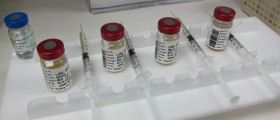
Drug allergy is a serious medical condition caused by repeated intake of certain medications. In severe form of the allergic reaction called anaphylaxis a person may even die due to circulatory collapse and severe shortness of breath.
How Does Drug Allergy Occur?
Many people seem to be allergic to drugs. Such adverse reaction is associated with abnormal response of one's immune system. Once the specific drug is taken, it triggers a series of chemical reactions which all contribute to damage of certain functions in the body.
This is how it all starts. Namely, the first time the drug is introduced to the body the immune system starts producing immunoglobulin E (IgE). Each and every repeated intake of the drug activates already synthesized IgE which sends signals to cells to release histamine. Excess of histamine is known to be a major contributor of an allergic reaction.
Even though in many cases drug allergy leads only to minor skin rash or hives, there are several more severe allergic reactions including serum sickness and anaphylaxis.
Penicillin is antibiotic capable of causing allergic reactions in many people. Apart from this drug people may be allergic to sulfa drugs, anticonvulsants, insulin preparations (especially if these are obtained from animals) and iodinated X-ray contrast dyes.
Clinical Characteristics of Drug Allergy
As it has already been mentioned mild allergic reaction is generally in a form of itchy skin rash and hives. However, anaphylaxis is a serious allergic reaction, which, if left untreated, inevitably leads to lethal outcome.
Anaphylactic reaction is characterized by hives, skin rash, itching of the eyes, swelling of the lips, tongue and face and wheezing. Patients may additionally complain about abdominal pain/cramping, diarrhea, nausea and vomiting. They are confused, dizzy, lightheaded and feel like fainting. Breathing difficulty is in a form of severe shortness of breath and heart rate is rapid.
Treatment for Drug Allergy
It is essential to recognize drug allergy and start with treatment as soon as possible. Patients are administered antihistamines, drugs that will prevent further release of histamine, a substance responsible for all the symptoms and signs of drug allergy. Patients suffering from breathing difficulty require bronchodilatators. Corticosteroids are also a drug of choice when it comes to allergic reactions. Anaphylaxis requires epinephrine injections.
Prognosis and Prevention
Many patients respond well to treatment. Some may develop severe asthma, anaphylaxis and even die.
It is not possible to prevent the development of drug allergy. But if the allergy is confirmed, it is possible to prevent repeated allergic reactions by avoiding the particular drug.
The doctor may recommend allergic patients so called desensitization, the procedure during which an allergic person receives very small doses of the drug responsible for the allergy over a specific period of time. This is performed under close supervision because even this procedure may cause serious problems.
- medlineplus.gov/ency/article/000819.htm
- healthfinder.gov/api/Outlink/Search/http/www.fda.gov/Drugs/ResourcesForYou/ucm163354.htm?_label_=Learn+how+to+avoid+problems+from+taking+your+medicine+with+other+medicines+or+certain+foods
- Photo courtesy of Natr by Wikimedia Commons: commons.wikimedia.org/wiki/File:Drug_eruption3.jpg

















Your thoughts on this
Loading...